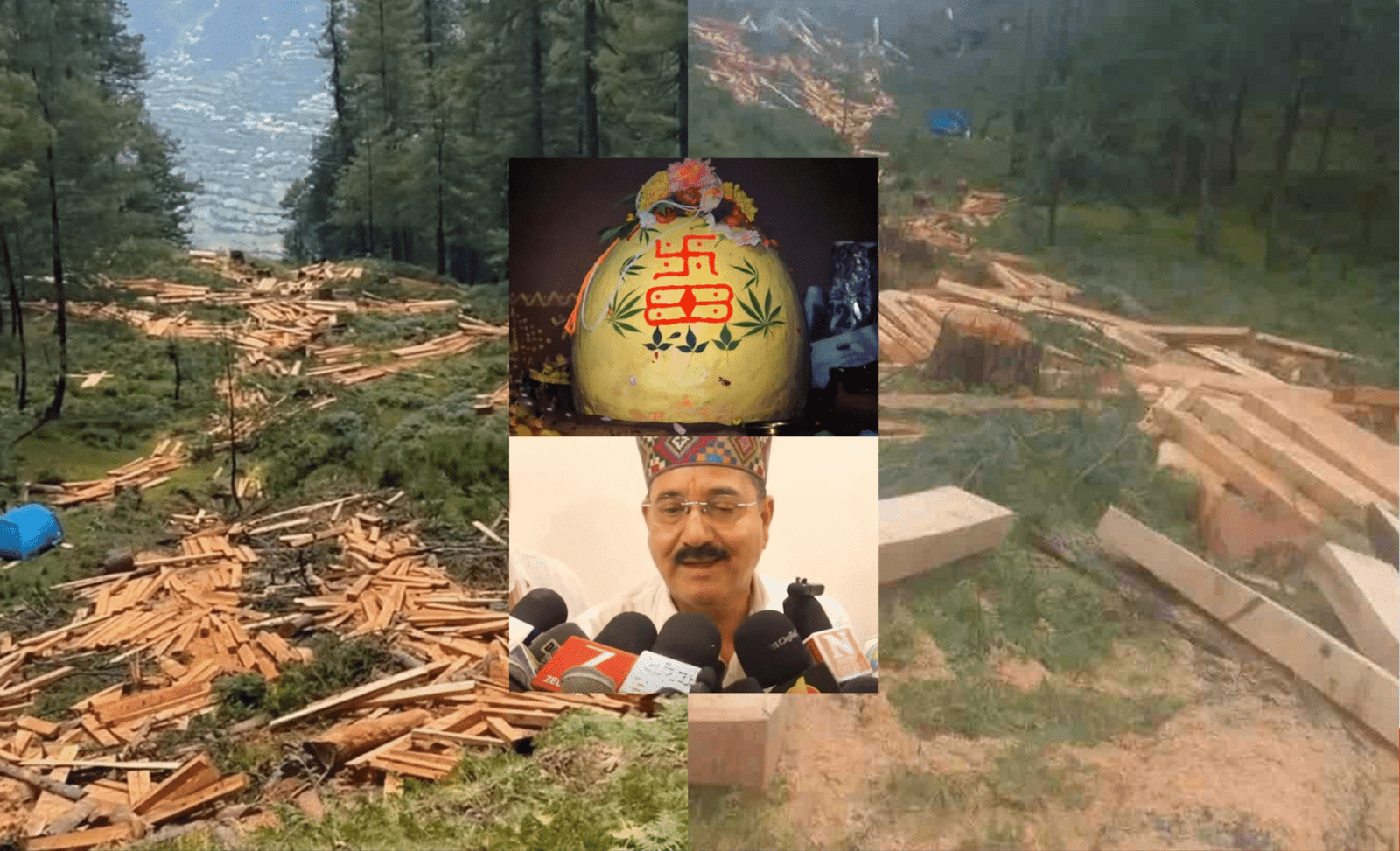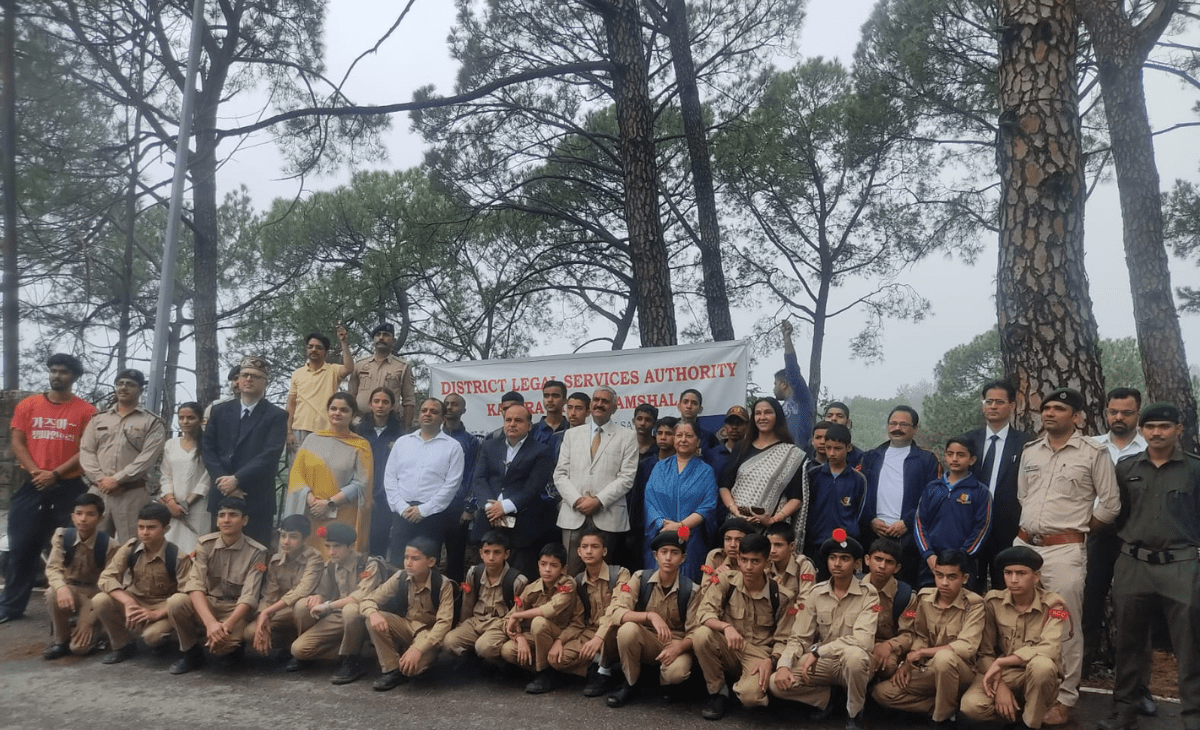Locals, environmentalists, religious leaders unite in protest; BJP and Congress face heat amid political flip-flops
Munish Sood
MANDI: In the lap of the Himalayas, amidst deodar forests and centuries-old faith, a storm is brewing. The proposed Bijli Mahadev Ropeway project, touted as a dream initiative of Prime Minister Narendra Modi, is facing unprecedented resistance in Himachal Pradesh’s Kullu valley.
What began as murmurs of dissent have now escalated into a full-blown agitation — drawing in villagers, priests, environmentalists and former political leaders, all united in defence of what they call “Dev Bhoomi’s dignity.”
Not tourist site, but sacred shrine, says APMC ex-chairman
The most vocal opposition came recently from Ram Singh, former Chairman of Kullu APMC, who held a fiery press conference rejecting the ₹274 crore project.
“Bijli Mahadev is a sacred pilgrimage site, not a tourist attraction. We will not allow this ropeway to be built at any cost. We stand with the will of the deity and the people,” said Ram Singh.
He questioned the silence of elected representatives who, he claimed, had previously opposed the project but are now quietly supporting it. “If the public is against it, if the deity has spoken against it, then who is this project really for?” he asked.
Ram Singh further revealed that 72 trees had already been cut and 206 are approved for felling, despite the region being geologically fragile and prone to landslides.
Environmental concerns deepen
Kullu, nestled in a seismically active and eco-sensitive zone, is witnessing what environmentalists fear may be irreversible damage. The proposed ropeway alignment runs through dense forest terrain that acts as a natural landslide buffer.
“You’re not just cutting trees but you’re slicing through an entire ecosystem. Sacred groves, ancient springs, and wildlife corridors are all at stake,” said local conservationist Megha Rana.
She warned that the region has already seen unusual soil erosion this monsoon, which are signs of ecological destabilisation.
Deity’s mandate: Opposition rooted in faith
In Himachal Pradesh, spiritual consent matters as much as political approval. Bijli Mahadev, the revered temple perched above the confluence of the Beas and Parvati rivers, is believed to be guarded by divine will.
Oracles — spiritual messengers in local tradition — have repeatedly conveyed that the deity disapproves of the ropeway.
“We don’t speak on our own. The deity has said no. That should end the matter,” stated a temple priest involved in the ritual consultation.
Faith leaders from neighbouring villages have echoed similar sentiments. The conflict, thus, is not merely environmental but it is theological.
Project origins and contested rollout
The ropeway project, estimated at ₹274 crore, was officially inaugurated by Union Minister Nitin Gadkari on March 5, 2025, under the National Ropeways Development Program “Parvatmala.” On July 10, the project’s civil works were formally initiated. Images of former MP and ‘chhari bardar’ (royal mace bearer) of Lord Raghunath, Maheshwar Singh, attending the bhoomi pujan sparked controversy. Singh later issued a clarification, reiterating his long-standing opposition: “I have always opposed the ropeway project and will continue to do so. Sacred lands cannot be bartered for tourism,” said Maheshwar Singh.
Officials deny allegations, call viral images ‘misleading’
In response to mounting outrage, Reena Pawar, Project Director of the National Highways Logistics Management Limited (NHLML), stated that the project is being implemented within the framework of all legal and environmental regulations.
“Forest clearance was granted before land handover. Every tree felled is accounted for under the Forest Corporation’s supervision. Many of the viral images are recycled or unrelated to this site,” she explained.
Pawar added that regular environmental monitoring, including soil testing and wildlife assessments, is being conducted. However, locals remain unconvinced, citing the increasing frequency of floods, landslides and vanishing springs as proof that the damage is already underway.
Political hot potato: Both BJP, Congress under fire
Once united in opposition, now both the ruling BJP and opposition Congress are facing public anger for their perceived U-turns. Political observers note that while some leaders publicly support the project citing tourism and employment opportunities, others are maintaining silence — a move being viewed as politically opportunistic.
“They held protests with us last year. Today, they’re standing with contractors. We feel betrayed,” said Ravi Sharma, a shopkeeper from Ramshila.
This cross-party ambivalence has fuelled accusations of collusion with private developers at the cost of local traditions, ecology, and democratic consultation.
Central policy change raises red flags
Adding fuel to the fire, the Ministry of Environment recently amended forest clearance norms, exempting ropeway projects from requiring prior forest approval, compensatory afforestation, and NPV payments.
Experts say this legal loophole undermines years of forest conservation policy and opens the door to unchecked commercial exploitation of fragile hill regions.
“This isn’t just a Kullu issue. It sets a precedent across India’s hill states,” warned retired IFS officer Rajendra Panwar.
Alternate visions for development
Many locals aren’t against development — they’re demanding sustainable alternatives. Suggestions include:
• Improving the existing trekking route
• Enhancing eco-tourism infrastructure
• Investing in remote areas like Pangi and Bara Bhangal, which remain disconnected for months
“Why sacrifice a heritage forest for a 3-km shortcut when better roads and eco-models can serve the same purpose?”asked Kharal Valley resident Sarita Thakur.





